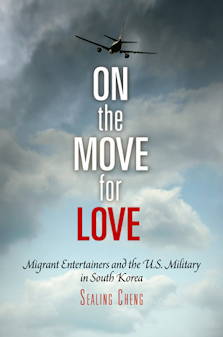New Book by Wellesley's Sealing Cheng Explores
'Migrant Entertainers'
and the U.S. Military in South Korea
FOR IMMEDIATE RELEASE:
April 15, 2010 |
|
WELLESLEY,
Mass.— Since the Korean War, women have worked as hostesses in clubs catering to a U.S. military clientele in South Korea. As the nation’s economy advanced dramatically in the 1990s, the low pay and stigma associated with the work led to a shortage of Korean women willing to work in these camp towns, known as gijichon. Club owners began to bring in women from developing countries to serve as “entertainers” – often understood as a euphemism for prostitutes.
 Are women who travel to work in these clubs victims of trafficking, sex slaves or simply migrant women? How do they understand their experiences? Are anti-trafficking initiatives helping in protecting their rights as women, migrants, and workers? Are women who travel to work in these clubs victims of trafficking, sex slaves or simply migrant women? How do they understand their experiences? Are anti-trafficking initiatives helping in protecting their rights as women, migrants, and workers?
Sealing Cheng, assistant professor in the Women’s and Gender Studies Department at Wellesley, attempts to answer these questions in her new book, “On the Move for Love: Migrant Entertainers and the U.S. Military in South Korea” (University of Pennsylvania Press, April 2010.)
“My goal is to reveal some of the human stories entrenched in this phenomenon – stories that have been covered under the blanket definition of ‘sex trafficking,’” she said. “The complexity of these women’s lives and their creative responses suggest that looking at them only through the lens of sexual victimhood would continue the practice of defining women exclusively by their sexuality and of erasing the multiplicity of their identities, as well as their drive, motivation and determination to struggle against their subordination.”
Cheng’s illumination of the migrants’ experiences has gained praise from her colleagues.
“Cheng has struck the perfect balance between depicting the exploitation, pain, frustration and sorrow experienced by the women in gijichon and the experiences that illustrate women's choices, hopes, strategies, good humor and overall humanity,” said Nicole Constable of the University of Pittsburgh.
Carole S. Vance of Columbia University called the book a “head-spinning, richly detailed and fiercely original account of migrant Filipina entertainers in Korea.”
“Deft and nuanced, embracing contradiction, and brave in honoring Filipinas' ‘dreams of flight,’ this book is absorbing, moving and a great read,” Vance said. “Destined to become a classic in gender/sexuality studies, migration, ethnography and global South courses.”
In her research, Cheng focuses on issues of sexuality, prostitution, migration, trafficking and human rights, particularly in South Korea. Her courses at Wellesley include “Introduction to Women’s Studies,” “Global Feminism,” “Love and Intimacy” and “Migration, Gender, and Globalization.”
Incorporating activism and arts into her academic work, Cheng organized a photo exhibition of works taken by women in a red-light district with the Courageous Women Research Center in South Korea. The exhibition, "Our Lives, Our Space," have been travelling to Wellesley, New York University, the University of Pittsburgh and Columbia University in 2009-10. Her journal articles have appeared in Feminist Review, Harvard Journal of Health and Human Rights, International Feminist Journal of Politics, East Asia, and Asia-Pacific Viewpoint.
Cheng received her doctorate in anthropology at Oxford University. She was a Korea Foundation Fieldwork Research Fellow in 2008, studying globalization of anti-trafficking policies in South Korea. Before coming to Wellesley, she taught at the University of Hong Kong and was a Rockefeller Postdoctoral Fellow in the Program for the Study of Sexuality, Gender, Health and Human Rights at Columbia University. She has also taught at the Summer Institute on Sexuality, Culture and Society at the University of Amsterdam, the Netherlands, and at the Sexuality, Gender and Rights Institute: Exploring Theory and Practice in Istanbul.
Since 1875, Wellesley College has been a leader in providing an excellent liberal arts education for women who will make a difference in the world. Its 500-acre campus near Boston is home to 2,300 undergraduate students from all 50 states and 75 countries.
###
|

